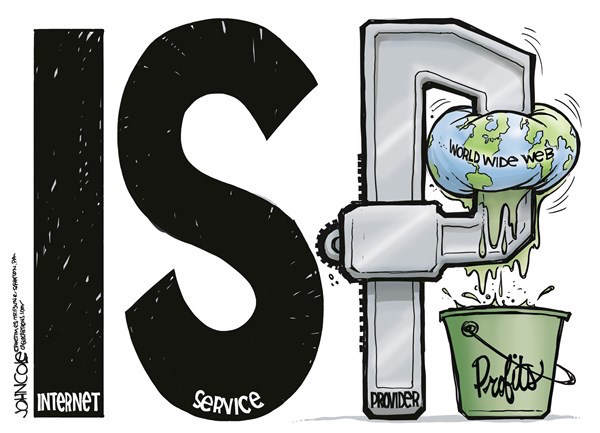Net Neutrality Is Internet Equality for All
The Web as We Know It Is Under Attack, but It Is Not Too Late to Stop It

The web as we know it is under attack, but it is not too late to stop it. Trump’s Federal Communications Commission is trying to destroy the fair and open access we all have to the internet by ending “net neutrality.”
Net neutrality is simply another way to say “internet equality.” It means simply that everyone — vendors like Amazon and Netflix, social media companies like Facebook and Twitter, as well as every consumer browsing the internet from work, home, or mobile phones — all have equal access to the internet. This is not about how fast the connections are for these vendors or individual consumers; we all know that you pay more for faster connections. The issue here is about the information as it flows from its source to the information consumer, and whether those giant routers and switches in the core of the internet treat each bit of information equally.
This means that on the internet, Comcast, Time Warner, Cox and other telecommunications companies cannot favor one supplier — like Netflix, or Hulu — over your local community services, your doctor, or your personal web pages. It means that the big cable companies and conglomerates that provide the news can’t favor their news services over others.
When you consider how important news services are today in learning the truth, with many citizens getting all or most of their news and information over the web, this issue is significantly more serious than just whether you get to see Game of Thrones streaming better than Stranger Things.
On Thursday, December 14, the Federal Communications Commission (FCC) will vote on whether to maintain current rules regulating internet service providers (ISPs) as “telecommunications services” (like public utilities) or return them to weaker regulations as “information services.” Individual consumers should be opposed to relaxing the rules on ISPs because these changes will inevitably lead to higher prices for consumers and greater influence for the large ISPs. In addition, new internet startups will face new hurdles, limiting innovation in the internet economy.
ISPs, the giant companies that provide the pipes for the internet to get to homes and businesses, are especially scrutinized now, since the net neutrality laws of 2015. The laws originally designed to regulate them in the early 1990s did not anticipate the huge, varied, and important web we know today. Since the internet is now a critical resource for news and information, these changes could have a wide-ranging impact on the social and political landscapes of the future.
Consumers have been protected from unfair internet practices in two ways: regulations on content and regulation on ISPs. Content is regulated according to standards for legality and decency. Those standards are not the issue here. The other protection is regulation of ISPs.
In 2014, we saw Comcast charge Netflix more for faster access to consumers. Such charges invariably end up being paid by consumers. All the big ISPs say now, “We’d never do that to you,” but the history remains and the protections would be gone. Consumers are right to be skeptical of powerful companies (or presidents) that say, “Trust us,” but then oppose regulations to bolster that trust.
In 2015, the FCC strengthened its oversight of ISPs to be more like utilities and phone companies with greater consumer protections, including privacy protections, rules prohibiting blocking or throttling of legal content, and rules prohibiting prioritization of content, like the Comcast deal with Netflix. These greater protections could be reversed on Thursday at the FCC meeting. ISPs (e.g., Comcast, AT&T, Verizon, Cox) favor the reversal, while internet content providers (e.g., Netflix, Amazon, Google) oppose it. Consumer groups (like the Consumers Union and the ACLU) are also vehemently opposed.
On a neutral playing field, all media and information are treated equally as they flow over the Internet. Payments for preferential access — allowable pre-2015 and maybe again after Thursday’s meeting — would go to ISPs, so it is understandable ISPs support a the rollback of these protections and content providers, who would be paying these fees, oppose it. The bottom line is that these new regulations will raise prices for consumers and hurt competition and innovation in the digital economy,
The Trump administration would like us to think this a done deal. It is not. Your voice can still be heard. We all have to put pressure on the ISPs, cable companies, and our government to stop this.
The internet belongs to all of us. There should be equal access for all to this critical resource, just like other utilities. If you want to stop this business takeover of the internet, contact these organizations and tell them to keep consumer protections in place.
Below are key people we all should all be contacting to support net neutrality.
Chairman Ajit Pai: 202-518-7399 / email: Ajit.Pai@fcc.gov/ Twitter: @AjitPaiFCC
Commissioner Michael O’Rielly: 301-657-9092 / email: mike.o’rielly@fcc.gov Twitter @mikeofcc
Commissioner Brendan Carr: 202-719-7305 / email: Brendan.Carr@fcc.gov/ Twitter: @BrendanCarrFCC
Keith Carlson and Mitchell Kriegman are members of Indivisible Santa Barbara.



